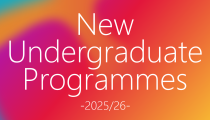Sept 2025 Entry
2 years
Normally 71 (plus training credits)
The actual number of credits required will be determined by the transfer of credits granted based on AD/HD results.
The curriculum of this programme, including the credit requirements, is subject to review.
The exact study duration and number of credits to be transferred will depend on the entry qualification of individual AD/HD admittees.
All information is subject to change without notice.
What's New
Programme Aims
This programme aims to make full use of the hugely versatile applications in the in-demand disciplines of electrical engineering to broaden the career opportunities of our graduates. Students are expected to acquire a solid understanding of the fundamentals of electrical engineering and apply the knowledge gained and techniques learned to relevant areas in the field of transportation systems.
The programme philosophy focuses on the incorporation of up-to-date engineering knowledge into transportation systems to enhance the efficiency, reliability, safety and maintainability of infrastructure and services. Current practices in transportation, the latest technologies in transportation systems and their integration to provide engineering solutions to practical problems form the core of the programme.
Programme Characteristics
BEng (Hons) in Transportation Systems Engineering is unique in Hong Kong, providing students with interdisciplinary knowledge and perspectives in modern transportation systems with a direct career path into the high-growth transportation industry and related sectors.
Engineering practice is an integrated component of the curriculum. Student learning is supplemented by a variety of laboratory, training and project activities. Students also develop good presentation and problem-solving skills through mini-projects and final-year projects. Students are required to take the Work-Integrated Education (WIE) component, which may be in the form of summer training or industrial attachment.
Engineering and Entrepreneurship Club (E&E Club) provides a platform to enhance students’ interests in engineering and understanding of entrepreneurship. E&E Club organizes workshops to train students’ technical skills and invites experts to share about the requirements of entrepreneurship with students. It further supports students participating in both local and overseas underwater robot competitions.
Seminars, industrial visits and overseas study tours are also organized to broaden students' horizons.
Professional Recognition
BEng (Hons) in Transportation Systems Engineering has been granted full accreditation by the Hong Kong Institution of Engineers (HKIE).
Career Prospects
Graduates can expect to receive attractive offers from various government departments, public and private transportation service providers, civil, electrical and transportation engineering consultancies, and construction companies. They are well equipped to work in Hong Kong, Mainland China and overseas.
The programme for senior year students consists of:
-
General University Requirement (GUR) subjects
-
Discipline Specific Requirement (DSR) subjects
-
Training Credits
-
Work-Integrated Education
General University Requirement (GUR) [9 credits]
- Cluster-Area Requirements (CAR) (6 credits)
- Service Learning (3 credits)
- Essential Components of General Education (a non-credit bearing subject)
- Language and Communication Requirements (LCR)
Remarks: Those students not meeting the equivalent standard of the Undergraduate Degree LCR (based on their previous studies in AD/HD programmes and their academic performance) will be required to take degree LCR subjects on top of the normal curriculum requirement.
Discipline-Specific Requirement (DSR) [62 credits out of the followings]
-
Engineering Economics (3 credits)
-
Information Technology (3 credits)
-
Engineering Management (3 credits)
-
Professional Communication in English for Engineering Students (2 credits)
-
Professional Communication in Chinese (2 credits)
-
Science (any ONE from Fundamentals of Materials Science and Engineering, Biology, Chemistry) (3 credits)
-
Society and the Engineer (3 credits)
-
Applied Electromagnetics (2 credits)
-
Power Transmission and Distribution (3 credits)
-
Transportation Engineering Fundamentals (2 credits)
-
Transportation Operations and Management (3 credits)
-
Transportation and Highway Engineering (3 credits)
-
Transportation Systems Analysis (3 credits)
-
Transportation Data Analytics (3 credits)
-
Transport Operations Modelling (3 credits)
-
Design of Transport Infrastructure (3 credits)
-
Traffic Surveys and Transport Planning (3 credits)
-
Transport Management and Highway Maintenance (3 credits)
-
Intelligent Transportation Systems (3 credits)
-
Individual Project (6 credits)
-
Advanced Elective 1 (3 credits)
Students are considered for credit transfers based on their previous studies in AD/HD programmes and their academic performance.
Training Credits [11 credits]
-
Industrial Placement Fundamentals (1 training credit)
-
Engineering Communication and Fundamental (4 training credits)
-
Industrial Placement (A minimum of 4 weeks) (2 training credits)
-
IC Training I (TSE) (4 training credits)
Work-Integrated Education
Students are required to take the Work-Integrated Education (WIE) component, which may be in the form of summer training or industrial attachment.
Students may be required to take additional subjects if they do not have pre-requisite knowledge for all of the above subjects.
-
Basic Mathematics I – Calculus and Probability & Statistics (3 credits)
-
Basic Mathematics II – Calculus and Linear Algebra (3 credits)
-
Mathematics I (3 credits)
-
Mathematics II (3 credits)
-
Physics I (3 credits)
-
Physics II (3 credits)
-
Computer Programming (3 credits)
-
Circuit Analysis (3 credits)
-
Electronics (3 credits)
-
Electrical Energy Systems Fundamentals (2 credits)
Normally 71 (plus training credits)
The actual number of credits required will be determined by the transfer of credits granted based on AD/HD results.
Dr W.H. Gu
MA, MSc, PhD
A Higher Diploma or an Associate Degree in Electrical Engineering or a relevant discipline.
| Tel. No. | Email Address | Website |
| 2766 6150 | eee.notice@polyu.edu.hk | www.polyu.edu.hk/eee/ |
To conduct an all-round (academic and non-academic) evaluation of the interests, achievements and ability of applicants.
About 10-15 minutes
Selected applicants will be invited to interview, if necessary.







